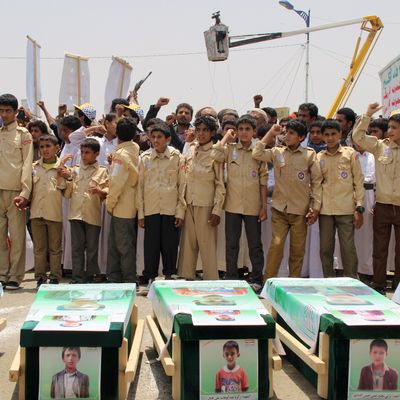
On Tuesday, both Secretary of State Mike Pompeo and Defense Secretary Jim Mattis called for an end to the brutal war in Yemen. “We’ve got to move towards a peace effort and we can’t say we’re going to do it some time in the future. We need to be doing this in the next 30 days,” Mattis said. Pompeo added, “The time is now for the cessation of hostilities.”
Taken together, the statements amount to the strongest language yet from the U.S. since the war began three years ago. And they’re a part of a coordinated push to bring an end to what the U.N. calls the “world’s worst humanitarian crisis,” according to several reports.
The Trump administration’s souring on the war is attributed largely to two things: the killing of Jamal Khashoggi and increasing congressional opposition to the starvation and murder of children.
The Washington Post reports that Khashoggi’s killing, and Saudi Arabia’s dishonest response to it, has some in the administration unable to trust Riyadh. They’re questioning “what Saudi Arabia is telling U.S. officials about its conduct of the war in Yemen, especially its role in civilian casualties and human rights violations.” Of course, it’s absurd that it took Khashoggi’s murder for anyone to see what has been obvious for far too long — Saudi Arabia, in its ongoing fight against Houthi rebels, is massacring and starving civilians.
It’s that humanitarian crisis that has led to increasing congressional opposition to the U.S. role in the war. The U.S. provides refueling to Saudi jets, along with battlefield intelligence and weapons sales. That makes the U.S. complicit in the crisis, which was described at the U.N. last week, as the BBC reports:
At least 6,660 civilians have been killed and 10,560 injured in the war, according to the UN. The fighting and a partial blockade by the coalition have also left 22 million people in need of humanitarian aid, created the world’s largest food security emergency, and led to a cholera outbreak that has affected 1.1 million people.
The Trump administration believes that “bipartisan outrage in Congress over the war is making it increasingly difficult for President Trump to back Saudi Arabia,” according to The Wall Street Journal.
CNN reports that Trump also feels compelled to act because the New York Times is publishing photos of starving children. But it’s not the pictures themselves that bother Trump, or U.S. complicity in the suffering of the children. Rather, CNN reports, Trump’s worried that the Times is making the American public more aware of Yemen’s starving babies, and unlike him, they’ll want to stop it.





























